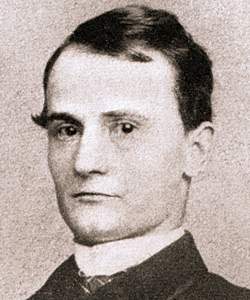Robert Roberts Hitt (Congressional Biographical Directory)
Robert Roberts Hitt (American National Biography)
Robert Roberts Hitt (New York Times)
ROBERT R. HITT
It is a curious coincidence that two newspaper men who accompanied Mr. LINCOLN in his famous tour of debates with Mr. DOUGLAS in 1858 should have risen to important place in connection with the foreign service of the United States. Mr. John Hay was introduced to his future career by the direct action of Mr. LINCOLN, who invited him to Washington as his private secretary. Mr. ROBERT R. HITT remained in Illinois until 1874, when President GRANT appointed him Secretary of Legation at Paris, whence he was appointed Assistant Secretary of State under Mr. BLAINE under Mr. Blaine, in 1881, and two years later entered Congress.
Like Mr. HAY, a Western boy, he, also like him, had a natural bent toward culture and toward the attentive study of foreign affairs. He was nearly a quarter of a century in Congress, and for most of the time served as a member, or Chairman, of the Committee on Foreign Affairs. And there was another analogy with Mr. HAY with the “coup” of Panama. Neither achievement was the most creditable in the record of the man closely connected with it, but each was undoubtedly undertaken with the conviction that it was the best thing possible at the time. In general, the influence of Mr. HITT was distinctly in the direction of wise and enlightened public policy. His range of information in foreign relations was not excelled by that of any one in the House of Representatives, and his long service gave him an authority that few thought of disputing. Personally, he was an amiable, accomplished, and winning gentleman. His death is a substantial loss to the Government.
Robert Roberts Hitt, Background (Sparks, 1908)
MR. ROBERT R. HITT
Robert Roberts Hitt was born in Urbana, Champaign County, Ohio, January 16, 1834. In 1837, the Hitts moved to Illinois and with their following settled in Ogle County, and established what became the village of Mount Morris. Educated at the Rock River Seminary at Mount Morris, an institution founded by his father and uncle, and later graduated from the Asbury (now Depauw) University of Indiana, the subject of this sketch trained himself in the art of phonography and in 1856 opened an office in Chicago and established himself as a court and newspaper shorthand reporter, the first expert stenographer permanently located in that city.
Robert Roberts Hitt, Stenographer (Sparks, 1908)
MR. ROBERT R. HITT
His work as a stenographer first brought him into the notice of Abraham Lincoln, then practicing law, and later as a newspaper reporter in reporting the campaign speeches of Lincoln and other prominent orators of the day, including Douglas, Logan, Lovejoy, and indeed of all the great speakers of the Middle West of that time. During the Lincoln-Douglas debates he was the verbatim reporter, receiving the highest praise from Mr. Lincoln for the accuracy of his work. During the sessions of 1858, 1859, and 1860, Mr. Hitt was the official stenographer of the Illinois legislature, having the contract for both the senate and the house.
Robert Roberts Hitt, Later Life (Sparks, 1908)
In 1867 and 1868 he made a tour of Europe and Asia,daily taking down in shorthand notes his impressions of the peoples and conditions of the countries and places visited. Upon his return he was again employed by the government in confidential cases, including missions to Santo Domingo and to the southern states to investigate the Ku Klux Klan, after which he became private secretary to Senator O. P. Morton, and in December of the same year was appointed secretary of legation at Paris, by President Grant, which position he held for six years. In 1880, upon the request of Mr. Blaine, then secretary of state. President Garfield appointed him assistant secretary, which position he resigned to become a candidate for Congress, to which he was elected in 1882. He served continuously from the Forty-eighth to the Fifty-eighth Congress. While serving his twelfth term, Mr. Hitt died on September 20, 1906 at Narragansett Pier, Rhode Island.







